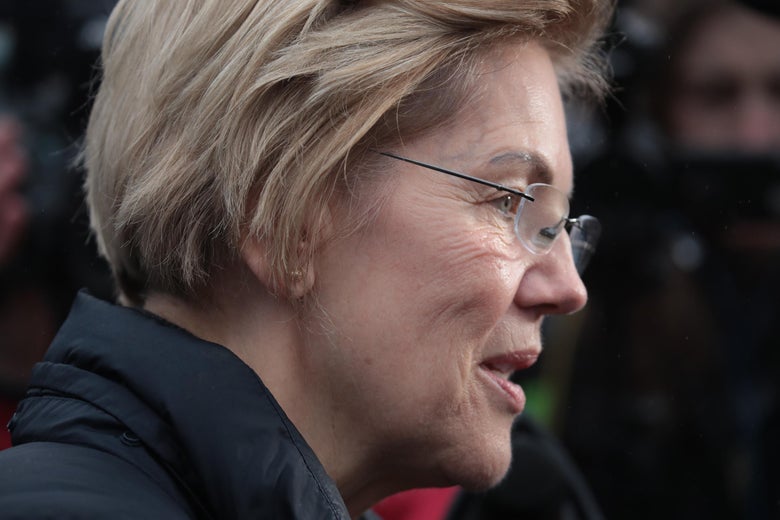
It would’ve been great, senator.
Scott Olson/Getty Images
Elizabeth Warren’s presidential hopes are looking dim. After a third-place finish at the Iowa caucuses, she is heading for a distant fourth in New Hampshire, with less than 10 percent of the vote. Her progressive rival Bernie Sanders is leading the Democratic primary, and appears to be consolidating support from the party’s left wing. Pete Buttigieg and Amy Klobuchar are winning over college-educated women, cutting away another key part of Warren’s base. In a speech Tuesday night, the senator from Massachusetts seemed to assure supporters that she wouldn’t drop out any time soon. “We might be heading for one of those long primary fights that last for months. We’re two states in,” Warren said. But it’s unclear how, exactly, she could make a comeback at this point.
It’s a sad denouement for a once-promising candidate who seemed capable of bridging the party’s left and its establishment, and who could articulate a progressive vision for the country without the baggage of referring to herself as a socialist. She laid out a sweeping agenda and injected bold policy ideas like mass student debt forgiveness and a wealth tax into the center of the race. She terrorized billionaires, who wept on television at the thought of her presidency. This fall, as she surged to a slim lead in national polls, Warren briefly seemed like a legitimate frontrunner. But then, within a couple of months, it all fell apart.
What went wrong? Sexism was almost certainly part of the issue—Warren, who in the past has been insulted as “hectoring” and “schoolmarmish,” faced constant questions about whether she was “likable” enough to beat President Donald Trump, in part because many male voters seemed to think she was not (to be fair, some women agreed). Polling also raised questions about her electability; she’s tended to beat Trump in head-to-head matchups, but by a smaller margin than Sanders or Biden (though by more than Buttigieg).
But above all, Warren seemed to get bogged down in the politics of health care. Instead of creating her own proposal from scratch, Warren attempted to win over the left wing of the party by wholeheartedly embracing Bernie Sanders’ Medicare for All plan. But while Sanders freely admitted during debates that he would raise middle-class taxes in order to pay for his legislation, Warren awkwardly danced around the question of how to finance it. As a result, the issue dogged her. There was that cringey Stephen Colbert interview and a wince-inducing debate performance in which she would only say that overall costs for families would go down. Eventually, Warren released a detailed plan for how to pay for single-payer without any middle-class tax hikes, but few experts or pundits found it particularly realistic. By mid-November, she backpedaled entirely and released a new plan, dropping single-payer in favor of an ambitious public-option bill that she claimed would help “transition” the country to Medicare for All. Amid all the waffling, her poll numbers sank and sank.
Why was Medicare for All such a quagmire for Warren? The simple, obvious answer is that it shredded her core pitch to voters. Warren was supposed to be the candidate with a plan to fix America. Her catchphrase was actually “I have a plan for that.” Except on health care—the single most important policy issue for most Democrats—she evidently did not. It was a glaring oversight that disillusioned some Democrats, and sent her campaign’s early momentum to a screeching halt.
The slightly more complicated answer is that Warren was trying to piece together a delicate coalition and managed to alienate both parts of it over health care. On the one hand, she was attempting to court progressives who might otherwise vote for Sanders. Many of them were always skeptical of her commitment to single-payer and had their doubts confirmed when she backed away from it. On the other hand, she was also pitching college-educated professionals who may have been cold on single-payer to begin with but liked the idea of putting a hyper-competent wonk in the White House. As she floundered on Medicare for All, many of these voters seemed to switch to Pete Buttigieg, another outwardly brainy candidate with professional-class appeal, who subtly reversed himself on single-payer early enough in the race for nobody to notice.
Some have suggested that a sexist double-standard may have been at play on health care, since Sanders still hasn’t explained exactly how he’ll finance single-payer, and that hasn’t stopped him from becoming the Democratic frontrunner. But I think that misses the key dynamic. Sanders has a lock on voters who believe so deeply in Medicare for All that they don’t care how he plans to pay for it. Warren was relying on a different, less forgiving band of supporters, who cared a lot more about details, or at least cared that their candidate appeared to have a command of them.
It’s not a mystery why Warren embraced Medicare for All—it seemed necessary to appeal to the left. But it’s a bit frustrating to imagine what might have been if Warren had chosen differently. Progressive Democrats could have had a clear ideological choice between candidates—one whose agenda centered on single-payer, and another who offered a credibly transformational agenda, but who admitted that nationalizing health care wasn’t realistic. Instead, we got one candidate who had a clear agenda on health care, and one whose plan was muddled.
Where does Warren go now? She’ll likely keep trying to reframe herself as a potential unity candidate, acceptable to the widest swath of Democrats. “We will need a nominee that the broadest coalition of our party will get behind,” Warren said Tuesday. The problem is that, as of right now, Warren doesn’t seem to have much of a coalition at all.
Readers like you make our work possible. Help us continue to provide the reporting, commentary and criticism you won’t find anywhere else.
Join Slate Plusfrom Slate Magazine https://ift.tt/2UMtOUS
via IFTTT
沒有留言:
張貼留言